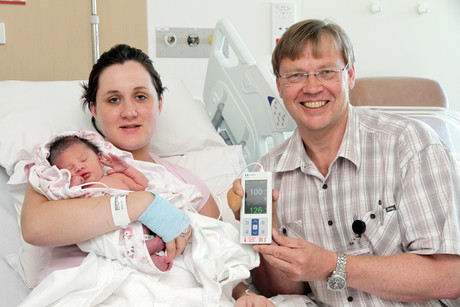Keeping newborns SAFE

Western Australia’s Fiona Stanley Hospital (FSH) is enabling mothers and newborns to experience the benefits of skin-to-skin care immediately after birth while keeping babies safe from suffocation.
Known as saturation assessment for early hours after birth (SAFE), newborns wear a tiny probe around their wrist which is attached to a pulse oximeter that monitors their oxygen levels.
The unobtrusive portable device sets off an audible alarm if the baby’s oxygen levels or heart rate fall to dangerous levels.
FSH Head of Neonatology Dr Jean Du Plessis said the aim is to prevent sudden unexpected postnatal collapse (SUPC), where healthy babies with no underlying medical conditions start to suffocate.
“The first two hours after birth is a higher-risk period, as mothers often want to hold their babies but are tired and the room is likely to be dimly lit,” Dr Du Plessis said.
“Continuously monitoring the baby allows for safe bonding and can give everyone involved peace of mind during an emotional and busy time.”
Research has shown that early skin-to-skin contact between mother and baby, also known as Kangaroo mother care, is beneficial for establishing breastfeeding and helps maintain the baby’s temperature.
However, such care has been associated with a higher risk of SUPC that can happen in a matter of minutes, leading to death or severe brain damage.
Dr Du Plessis said even though the risk of SUPC was small, it can be prevented by simply repositioning the baby before their heart rate drops.
“We are possibly the first in the world to introduce a system that keeps newborns safe, allowing them to be with their mothers without any gaps in monitoring,” he said.
“This added vigilance complements the regular observations already performed by nursing staff.”
Evaluation of the trial found the device also made parents more aware of their babies’ positioning and informed about the risks of SUPC.
The device is now used to monitor every baby born at FSH for up to two hours after birth.
Why physical device security is becoming a patient privacy issue in health care
One of the most immediate and preventable risks to patient data often goes overlooked: the...
Food waste in Australian hospitals and aged care homes — can AI help?
After working in hospitals, an Australian researcher has considered how hospitals and aged care...
From vision to vigilance: building a secure digital future for health care
Digital health adoption offers clear benefits, yet Australians continue to scrutinise how their...




![[New Zealand] Transform from Security Awareness to a Security Culture: A Vital Shift for SMB Healthcare — Webinar](https://d1v1e13ebw3o15.cloudfront.net/data/89856/wfmedia_thumb/..jpg)
![[Australia] Transform from Security Awareness to a Security Culture: A Vital Shift for SMB Healthcare — Webinar](https://d1v1e13ebw3o15.cloudfront.net/data/89855/wfmedia_thumb/..jpg)



